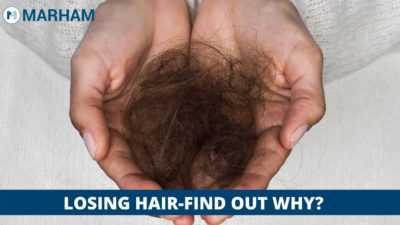It’s normal to find hair in your brush: we shed. However, if a person begins to lose an unusual amount of hair, this can be cause for concern. Losing hair usually has little effect on your appearance or warmth because your head has plenty of hair to compensate for the daily loss. When you notice your scalp or bald spots, there could be a more serious reason for your hair loss. So, what exactly are these different causes, and how do you know if they’re to blame for your excessive shedding? Let us know why you’re losing your hair.
Signs of Losing Hair
Before going towards causes of hair loss, let us tell you about signs of hair loss.
- Gradual thinning in hair
- Circular or patchy bald spots
- Sudden hair loss
- Full-body hair loss
- Scaling patches that spread across the scalp

Causes of Losing Hair
Now, it’s time to see the main causes of hair loss.
1. Hormonal Changes
Women may experience hair loss after giving birth or during menopause. Hair loss can occur in women who have hormonal imbalances Men can lose hair as their hormonal composition changes with age, in addition to genetic male pattern baldness. The response of your follicles to the hormone dihydrotestosterone (DHT) causes hair loss.
2. Stress
Hair loss can be caused by both physical and psychological stress. Excessive shedding can be caused by surgery, high fevers, and blood loss. Childbirth can cause hair loss that lasts for several months after the baby is born. The link between psychological stress and diffuse hair loss is less clear. Mental stress can be alleviated through lifestyle changes, such as:
- Daily exercise
- Proper nutrition
- Meditation
- Stress-reduction techniques
- Getting rid of known stressors in your life
3. Thyroid Problems
A thyroid problem is one of the most common hormone-related causes of hair loss. Hair loss can be caused by both too much thyroid hormone (hyperthyroidism and too little thyroid hormone (hypothyroidism. Hair loss can often be reversed by treating thyroid disorder.
4. Nutritional Deficiencies
The most common nutritional links to hair loss are zinc and iron. However, some evidence suggests that inadequate intakes of the following vitamins and nutrients may also be to blame: Such as fats vitamin D vitamin B-12 vitamin C vitamin A copper selenium biotin.


5. Medications
Pharmaceuticals can cause a variety of side effects, including hair loss. Chemotherapy is the most well-known cause, but there are others, such as:
- Thyroid hormones
- Certain oral contraceptives
- Beta-blockers
- Anticonvulsant medications
- Antidepressant medications
- Anticoagulant drugs
These medications may have different effects on different people and may not cause hair loss in everyone.
6. Other Medical Conditions
Other medical conditions that can cause abnormal baldness to include:
- Kidney failure
- IBD
- Diabetes
- Liver disease
Skin conditions like psoriasis and dermatitis can affect hair growth on the scalp. Hair loss can also happened by infections such as ringworm of the scalp and folliculitis. It’s understandable that people who are losing their hair are looking for causes and potential treatments.
According to research, hair loss is associated with lower self-esteem, body image issues, and increased anxiety. When diagnosing hair loss, the Journal of the American Academy of Dermatology recommends assessing for anxiety and stress.
Tips To Prevent Losing Hair
These tips may help you in avoiding multiple types of hair loss:
- Take proper care of your hair. Use a detangler when brushing and combing your hair and avoid tugging, especially if it is wet. A wide-toothed comb may aid in the prevention of hair loss. Harsh treatments to avoid include hot rollers, curling irons, hot-oil treatments, and permanents. Hairstyles that include rubber bands, barrettes, and braids can cause tension in your hair.
- Inquire with your doctor if you are taking any medications or supplements that may be causing hair loss.
- Protect your hair from the sun and other ultraviolet light sources.
- Stop smoking. Some research has discovered a link between smoking and male baldness.
- Talk to your doctor about getting a cooling cap if you’re going through chemotherapy. This cap may lower your chances of hair loss while undergoing chemotherapy.

The Bottom Line
Discuss your concerns with your doctor, as well as the possible causes of your hair loss. They can suggest a treatment that is appropriate for you. In order to help yourself on your own at home, you can follow the above mentioned tips.
FAQ’s
What is the most common cause of hair loss?
It can be caused by heredity, hormonal changes, medical conditions, or it can be a normal part of aging.
Why am I losing so much hair all of a sudden?
Stress, a poor diet, and underlying medical conditions are all potential causes of hair loss.
What is the best home remedy for preventing hair loss?
The following are some natural remedies for hair loss:
- Licorice Root
- Coconut Milk
- Green Tea
- Beetroot Juice
- Greek Yogurt
- Honey
What is causing my hair to fall out after COVID-19?
The final word. Many people experience hair loss months after recovering from COVID-19. This condition, known as telogen effluvium, is thought to be caused by the stress of being infected with COVID-19.
Book an appointment now to answer all your queries. You can book an appointment with the Best Dermatologists in Lahore through Marham by calling at Marham helpline: 0311-1222398 or by online booking facility through the website or Marham mobile app.
Can’t Find The App?
Android Users:
https://play.google.com/store/apps/details?id=controllers.marham.marhammed&hl=en
Drop a review for us at Playstore if you’ve had a good experience!
iPhone Users:
https://apps.apple.com/pk/app/marham-find-a-doctor/id1095243102
Stay Home. Stay Safe!

